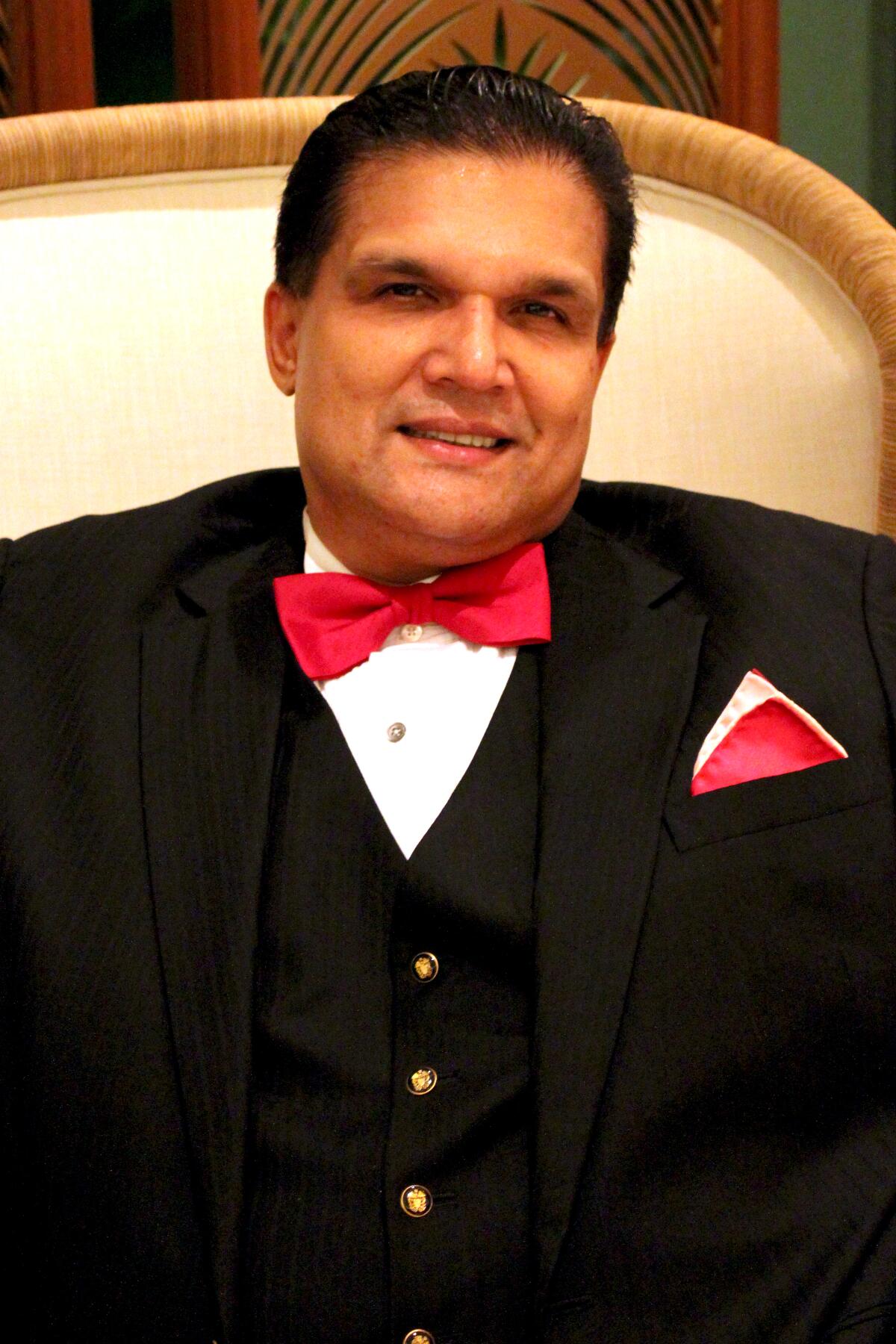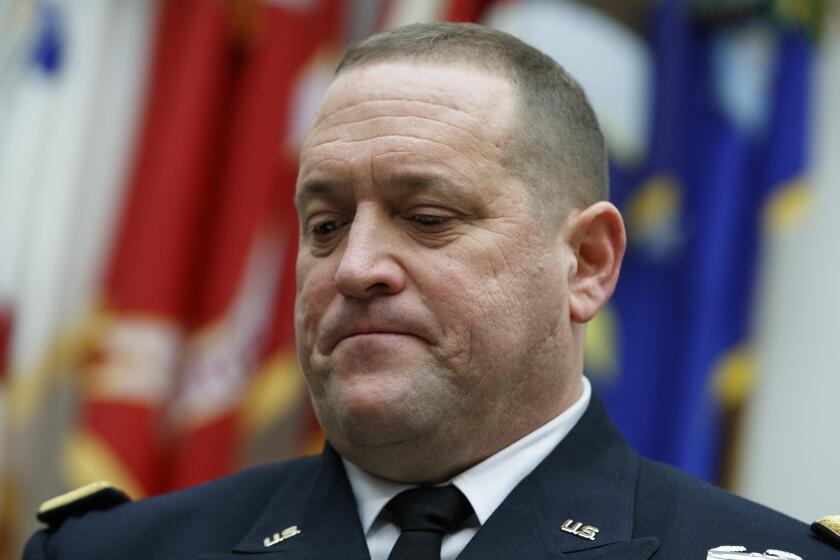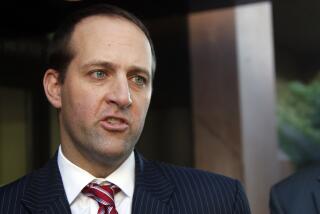‘Fat Leonard,’ set to finally be sentenced in long-running Navy bribery scheme, is on the run

- Share via
The military contractor known as “Fat Leonard,” the mastermind behind the worst public corruption scandal in U.S. Navy history who was three weeks away from being sentenced in the case, is on the run.
Leonard Glenn Francis, who has been under house arrest, cut off his GPS monitoring ankle bracelet and absconded from his San Diego home sometime Sunday morning, said Supervisory Deputy U.S. Marshal Omar Castillo.
Pretrial Services, the federal agency monitoring Francis, was alerted to an anomaly with Francis’ bracelet, and Francis’ defense team went to check on him, knowing he has a history of health issues. An attorney called San Diego police about 1:45 p.m., saying Francis was not answering their knocks or messages, and asked for a welfare check at the home in the Torrey Highlands neighborhood, according to police officials.
Officers arrived and entered the home through an unsecured door in a central courtyard and found the home empty — save for the sheared GPS bracelet left behind, according to police and marshals.
The U.S. Marshals Service was called to assist, and the San Diego Regional Fugitive Task Force was activated to begin the high-profile manhunt. The Naval Criminal Investigative Service, which spearheaded the massive case against Francis more than a decade ago, is also helping.
The retirement of Maj. Gen. David Baldwin comes weeks after a Times investigation detailed alleged misconduct among high-ranking officers.
Neighbors in the gated community told authorities that they had seen U-Haul moving trucks going in and out of Francis’ home in the days leading up to his escape, Castillo said. It was not known if neighbors knew Francis was the tenant of the sprawling multimillion-dollar home, which, according to real estate websites, has five bedrooms and seven baths. No one reported the moving trucks as suspicious, he said.
“He was planning this out, that’s for sure,” Castillo said.
Law enforcement agencies will be notified to be on the lookout for Francis — nicknamed for his girth — and alerts will be placed at international borders and airports, Castillo said. Investigators will also see if the U-Haul trucks show up on license plate readers throughout the state or at U.S.-Mexico border crossings. But he may have already crossed south, Castillo acknowledged.
The exact requirements of Francis’ house arrest, beyond the GPS monitoring, were not clear Monday. Previous court orders that were unsealed earlier this year show that U.S. District Judge Janis Sammartino had called for constant security 24 hours a day at Francis’ home. The security was provided by an unnamed private company, with Francis footing the bill. The location has been a long-kept secret — even from defense lawyers defending others implicated in the scandal, who had repeatedly asked for more information on his living arrangements.
Three of Francis’ children had been living with him, although it was unclear if they were as of Sunday.
Francis’ defense attorney, Devin Burstein, declined to comment Monday when reached by phone. A spokesperson for the U.S. attorney’s office did not respond to a request for comment.
Reports of sexual assaults across the U.S. military rose 13% last year, driven by significant increases in such incidents in the Army and the Navy.
The escape adds to the wild trajectory — and unprecedented nature — of the case.
Francis, a Malaysian national who ran his military contracting firm Glenn Defense Marine Asia from Singapore, was arrested in a San Diego hotel room in 2013 as part of a federal sting.
His company serviced visiting Navy ships in ports that he controlled across Southeast Asia, and for years he bribed U.S. Navy officials — many of them in the 7th Fleet — for their influence and access to military intelligence, allowing him to earn millions of dollars from Navy contracts.
He pleaded guilty in 2015, admitting to the massive bribery conspiracy and also to swindling the Navy out of at least $35 million in overcharges.
After several bouts with health issues, including kidney cancer, Francis was released on medical furlough with Sammartino’s permission and has been on house arrest since at least 2018. He has been under the supervision of Pretrial Services, a federal agency that monitors defendants who are out of custody until sentencing.
Both behind bars and later while on home confinement, Francis worked as a cooperating witness for federal prosecutors who continued to build cases against several others involved in the scheme, including high-ranking naval officers. His sentencing date had been put off for years as he assisted prosecutors and prepared for what was expected to be his star turn on the witness stand in the trial earlier this year against five former naval officers.
But for reasons unknown, Francis was never called to testify. Four of the officers were convicted, and the jury deadlocked on charges against the fifth. Twenty-nine others — Navy officials, defense contractors, Francis and his corporation — have pleaded guilty.
Both wars ended badly, with U.S. efforts in tatters. But they were worlds apart in who fought, how and what came of it.
With Francis’ usefulness to prosecutors seemingly at its end, a sentencing date was set for Sept. 22.
“Obviously it’s very disappointing,” San Diego attorney Michael Crowley, who defended one of the former Navy officers in the recent trial, said upon hearing of Francis’ escape. “He started all this and we wanted him to testify since this was the crux of the government’s case. Here, they’ve let him slip right through their fingers.”
Francis’ unique living arrangements have come under scrutiny previously.
On Dec. 17, 2020, Sammartino called a hearing after receiving a report that there was no security guard on site for nearly three hours.
A Pretrial Services officer making a routine check had showed up at the location at 11 a.m. — only to find no guard present. She did not receive word a guard was on site until 1:45 p.m., according to a court transcript of the hearing that was sealed for years before becoming public in January.
The guard said he had gone on a lunch break during that time.
Francis participated in the hearing by phone and was apologetic.
“I’m so sorry for what has happened, and I just want you to know that this will never happen again,” he told the judge, according to the transcript. “I’ve always been clear with my pretrial arrangement, and I’ve always been here, and I just want to apologize. I’m so sorry, ma’am.”
“OK,” Sammartino replied. “No, I appreciate that, Mr. Leonard Francis. I don’t think there is anything, you know, untoward that was being plotted here, or anything.”
In the hearing, the judge ordered that a third guard be hired. Previously, two guards worked 12-hour shifts, according to the transcript.
“This is a very significant issue,” she said, “and there’s a lot of interest in this matter, and I have assured people in the other case that’s pending that this is a legitimate medical furlough that’s been granted here, and that all appropriate steps have been taken, and when I saw this I realized that they were not being taken off if they were at some point in time, they had become lax, for whatever reason.”
The transcript is one of 14 hearings held from February 2018 through December 2021 on Francis’ health and living arrangements. All the hearings were held behind closed courtroom doors, and transcripts were sealed until Jan. 20.
The court file gives no specific reason why the 375 pages of the hearing transcript were released. But it came a couple of months after the release of a podcast Francis recorded at the location about the scandal — apparently without Sammartino’s, or the government’s, knowledge.
In another hearing that was previously under seal, Sammartino seemed surprised to find out that Francis’ mother and his children — who had lived overseas — were with him in the U.S. In the podcast that aired last fall, Francis confirmed that three of his children were living with him and attending school.
At the Oct. 14, 2018, hearing, his defense attorney asked for the conditions of Francis’ home release to allow “other activities pre-approved by probation.” Standard conditions allow people on a home release to leave the residence for work, education, religious services or medical needs. A probation officer explained that the new language proposed by the defense lawyer would allow Francis to attend church more often, and perhaps even go to a grocery store once in a while.
Also, the probation officer said, “his kids are in the United States, and he wants to take them to school,” according to the transcript.
“I didn’t know his family was here,” Sammartino responded. “His family is here now?”
Yes, Burstein replied.
“And they’ll get to see him?” Sammartino asked.
“They get to see him,” Burstein replied. He explained that Francis’ mother “brought the kids to visit” at some point, and apparently stayed.
Apparently, the mother and children live on the same property. Burstein explained that “the kids are here with Mom, not in the same residence. They’re in the main residence.”
In the end the judge declined to alter the order. “I’m a little concerned about making it home detention kind of in name only,” she said. “We’re taking the kids to school. Going to kids’ visits. I need to think this through, Mr. Burstein.”
Her final decision on the matter is unknown.
San Diego Union-Tribune staff writer David Hernandez contributed to this report.
More to Read
Sign up for Essential California
The most important California stories and recommendations in your inbox every morning.
You may occasionally receive promotional content from the Los Angeles Times.















